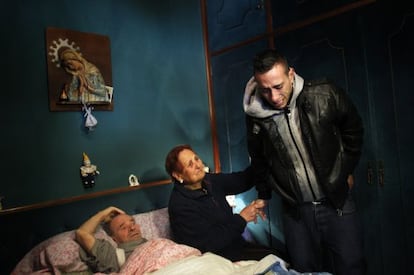Neighbors stop bank from evicting bed-ridden 74-year-old heart patient
With the help of friends, Vicente has a roof over his head - for now


A plaque on the wall of Vicente Torres' modest third-floor walk-up apartment in the Madrid working-class district of Carabanchel welcomes the visitor. In the first bedroom on the right lies Vicente himself, still in bed after a recent heart operation.
On April 18, widower Vicente narrowly avoided being evicted from his home after friends and neighbors rallied round, winning a last-minute reprieve when Citibank sent in court bailiffs to repossess his home.
The story dates back to 2004, when Vicente agreed to act as guarantor for his son, also called Vicente, who took out a mortgage with Citibank for 170,000 euros. But after Vicente's son stopped paying the loan last June, Citibank repossessed the property and the family moved to rented accommodation. Vicente's 24-year-old grandson Jonatan moved in to help look after him. Vicente's son has since distanced himself, and was not at last week's attempt to evict his father.
Among those who turned up to prevent Vicente and Jonatan from being kicked out was Emilio, a lifelong friend and former apprentice of Vicente, who was an upholsterer before retiring.
I closed my shop and came over here to help out this wonderful man"
"I closed my store today and came over here to help out this wonderful man," said Emilio after successfully helping stall the eviction process.
Vicente and Jonatan survive on the elder man's 600-euro pension. Jonatan, who left school when he was 12, is among the 50 percent of Spaniards under the age of 30 without a job. "I have worked in a paint shop, I've been a gardener and a plumber, and I've worked in kitchens," he explains. "But in the last three months I've been without any kind of work - I scrape by doing odd jobs. Somebody will give me 30 euros for fitting a tap, that sort of thing." The kitchen bears testimony to the pair's dire circumstances, with an all-but-empty fridge and bare cupboards.
A month ago, as the deadline for the eviction approached, Jonatan sought legal advice from a nearby community center run by the 15-M popular protest movement. He was put in touch with the Platform for the Mortgage Affected (PAH), which has successfully prevented others from being thrown out of their properties.
Citibank, which has refused to comment on the case, valued Vicente's home at 172,000 euros. He has lived in the 50-square-meter two-bedroom property for the past 30 years. During last week's attempt to evict him, Vicente remained in bed with the door closed. But friends and neighbors gathered out on the street and filled the hallway of his apartment.
Vicente and Jonatan survive on the elder man's 600-euro pension
"Citibank steals houses and throws people out onto the street," read one placard posted on the front of Vicente's house in his support. Without a sufficient number of police officers to break through the human shield, the bailiffs were unable to carry out the eviction order, but said they would be back on May 3.
Evictions have soared in Spain since 2008 when the property bubble burst, which triggered the country's economic crisis and ignited a wave of solidarity among the friends and neighbors of those affected.
The platform says it has helped block more than 150 evictions in Spain since 2009. Last week it added four to its tally in a single day. "The planned evictions have been suspended," said a source in the organization who asked not to be named.
Eviction procedures in Spanish courts for unpaid mortgages and rent hit a record of 58,241 in 2011, a historic high and a 21-percent rise over the previous year, according to judicial authorities.
Economy Minister Luis de Guindos recently asked banks to forgive mortgage debt for properties worth less than 200,000 euros and where all family members are unemployed. Most Spanish banks have said they will respect the new code. Bankia and two other large banks, Santander and BBVA, say they have refinanced thousands of loans for families in difficulties, giving them time to repay the money.
Congress has rejected proposals that would allow borrowers unable to meet mortgage repayments to cancel their debt by handing over the keys to the property to the lender, an approach permitted in the United States.
But the banks' appetite for foreclosures may also be on the wane because lenders are overloaded with repossessed properties. Foreclosure proceedings are also expensive, and the courts have big backlogs.
Tu suscripción se está usando en otro dispositivo
¿Quieres añadir otro usuario a tu suscripción?
Si continúas leyendo en este dispositivo, no se podrá leer en el otro.
FlechaTu suscripción se está usando en otro dispositivo y solo puedes acceder a EL PAÍS desde un dispositivo a la vez.
Si quieres compartir tu cuenta, cambia tu suscripción a la modalidad Premium, así podrás añadir otro usuario. Cada uno accederá con su propia cuenta de email, lo que os permitirá personalizar vuestra experiencia en EL PAÍS.
¿Tienes una suscripción de empresa? Accede aquí para contratar más cuentas.
En el caso de no saber quién está usando tu cuenta, te recomendamos cambiar tu contraseña aquí.
Si decides continuar compartiendo tu cuenta, este mensaje se mostrará en tu dispositivo y en el de la otra persona que está usando tu cuenta de forma indefinida, afectando a tu experiencia de lectura. Puedes consultar aquí los términos y condiciones de la suscripción digital.








































